How To Talk Like Doge
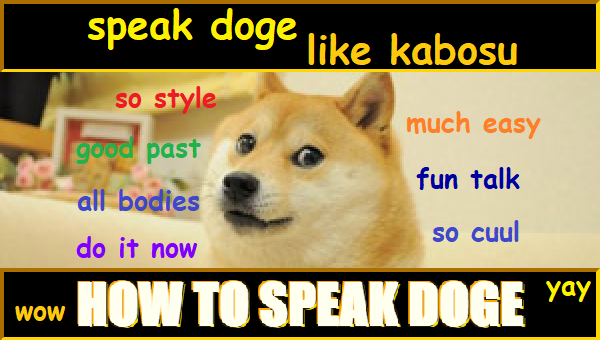
The dog shown in the picture is a Shiba Inu breed named Kabosu. Author Kyle Chayka published a post at online tech futurism blog The Verge titled "WOW THIS IS DOG"; that story has to be read to be believed, especially since it was posted on 31 December 2013-- literally weeks after the official release of Dogecoin. Below is a better picture of Kabosu:
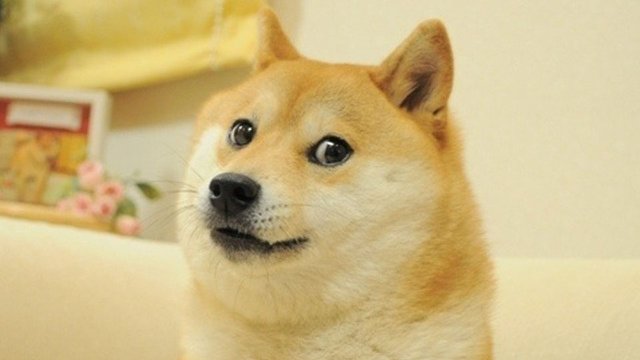
About Kabosu
We know Kabosu as the mascot for Dogecoin, and this mascot is known for a particlar "speaking" style we call Dogespeak (or, more simply, Doge).
About Doge (or Dogespeak)
Although the cryptocurrency Dogecoin was released in December 2013, according to KnowYourMeme he first occurrence of the word "doge" being used came in 24 June 2005 when Homestar from the series Homestar Runner used it to call Strong Bad "his d-o-g-e." On 13 February 2010 Atsuko Sato, a Japanese schoolteacher, posted a number of photos of Kabosu-- including the fateful photo which would make Kabosu the face of Dogecoin over three years later.
Dogespeak was just some Internet subculture limited to blogs on microblogging platform Tumblr.com as well as 4chan forums. It was the release of Dogecoin in December 2013 which catapulted Doge to worldwide popularity thanks to the Dogecoin community which adopted Doge.
Basic Impressions of Doge
By the time Dogecoin arrived, Doge settled on a standard pattern:
- Use lowercase letters;
- Use 2 or 3 words at most;
- Start with certain words (much, very, so, etc.);
- Include "wow" at least one time-- it's so important that it ended up on the physical coins or rounds;
- Simplify when possible;
- For memes--
- Comic Sans is the preferred font rather than Impact;
- Use several colored phrases, showing an inner dialogue;
- certain typos are allowed.
Oddly enough, the Shiba Inu is not required. Memes have shifted from Kabosu, to any Shiba Inu, to dogs in general, to essenially anything or anyone having an inner dialogue using Doge.
As with any rules, there are exceptions which prove them.
In the case of Doge, it had become popular enough that people can distinguish "good Doge" from "bad Doge".
Tale of the Tape
LOLcat is the meme language which came before Doge. The best example of LOLcat is "I CAN HAZ CHEEZBURGER?" Although LOLcat still has its place, Doge is dominating more memes these days. Perhaps that may change when a cat-themed cryptocurrency is released. Until then, it's Doge we care about these days.
Below is a table compiled from an io9 article written by Annalee Newitz titled "We who spoke LOLcat now speak Doge" comparing LOLcat and Doge:
| LOLcat | Item | Doge |
|---|---|---|
| Cat | Animal | Dog (Shiba Inu) |
| All-caps | Default Case | All-small |
| Monochrome with optional outline | Text Style | one color per phrase |
| Impact | Font | Comic Sans |
| Top, or Bottom, or Both | Text Positioning | Anywhere |
| Normal with questionable grammar | Sentence Structure | Phrases (1-3 words) |
| Allowed | Typos | Allowed |
| Spoken pronouncements | Voice Used | Inner Dialogue with observations |
| Loud | Attitude | Contemplative |
| ● "I can haz" ● "I'm in ur" ● Anything by a grumpy cat | Verbal Tics | Modifiers such as so, very, such, much, and many |
| Full-blown language | Vocabulary | Limited |
| Mean Drunk | Human Model | Observant Stoner |
| Easy to learn, easy to master | Difficulty | Easy to learn, hard to master |
| Minimal to none | Use of Prepositions | Minimal to none |
| Permitted | Use of Verbs | Permitted |
| Common | Meme Generators | Rare |
Neither LOLcat nor Doge is better or worse than the other. Both have their place. Since Dogespeak is closely associated with the Dogecoin community, let's learn more about Doge.
Doge with Memes
In her article for online magazine The Toast, linguist Gretchen McCulloch includes several pictures of memes featuring Doge:
 | 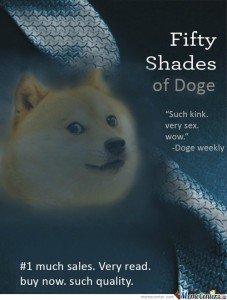 |  |
|---|---|---|
| Click for larger image | Click for larger image | Click for larger image |
Doge without Memes
While most Doge is used in the form of memes showing a picture of an animal or a person having an inner dialogue, Doge isn't limited to memes. The physical representations of Dogecoin themselves use Doge. Pure text in standard font and in monochrome can be written in Doge. If you can eliminate the markers of Doge while maintaining Dogespeak, then what you have is indeed Doge content.
Romeo and Juliet in Doge
At the Tumblr blog by "@"daysofstorm, this pieece of Shakespeare was translated into Doge. Below are a screen capture, quotations, and a table showing the same scene from Romeo and Juliet:
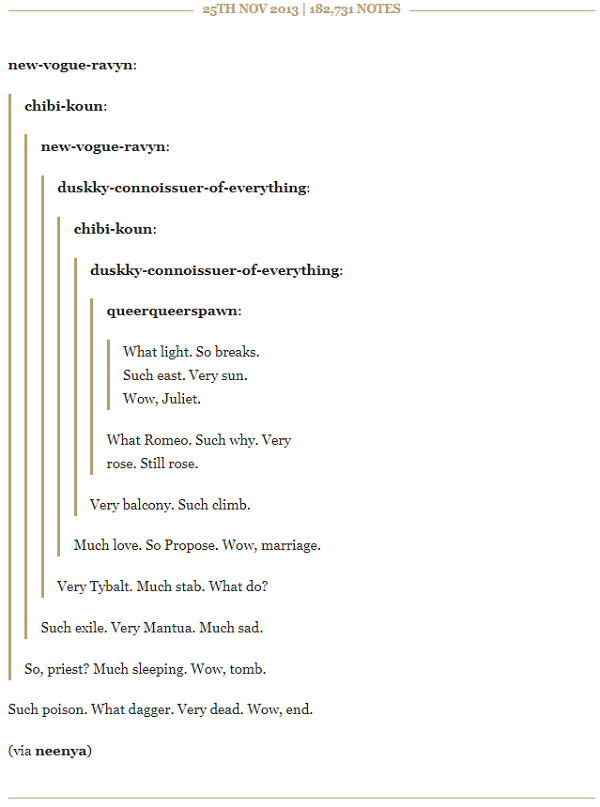
new-vogue-ravyn:
chibi-koun:
new-vogue-ravyn
duskky-connoissuer-of-everything:
chibi-koun:
duskky-connoissuer-of-everything:
queerqueerspawn:
What light. So breaks. Such east. Very sun. Wow, Juliet.
What Romeo. Such why. Very rose. Still rose.
Very balcony. Such climb.
Much love. So Propose. Wow, marriage.
Very Tybalt. Much stab. What do?
Such exile. Very Mantua. Much sad.
So, priest? Much sleeping. Wow, tomb.
Such poison. What dagger. Very dead. Wow, end.
| Translator | Translated Line |
|---|---|
| queerqueerspawn | What light. So breaks. Such east. Very sun. Wow, Juliet. |
| duskky-connoissuer-of-everything | What Romeo. Such why. Very rose. Still rose. |
| chibi-koun | Very balcony. Such climb. |
| duskky-connoissuer-of-everything | Much love. So Propose. Wow, marriage. |
| new-vogue-ravyn | Very Tybalt. Much stab. What do? |
| chibi-koun | Such exile. Very Mantua. Much sad. |
| new-vogue-ravyn | So, priest? Much sleeping. Wow, tomb. |
| daysofstorm | Such poison. What dagger. Very dead. Wow, end. |
If the works of William Shakespeare could be translated into Doge, what else can be translated? (Probably not this post, but who knows?)
Word Categories
Verbs
Verbs don't often appear in Doge, except in the form of commands ("buy now"; "eat fruit"). Just from observation, verbs used in Doge tend to be one or two syllables long. These verbs are also in the most simplified form possible. That is, reduced to as few letters and syllables as possible. The vast majority of Doge we see (or hear) is combinations of adjectives and nouns. Not including "wow," there will be the occasional exclamation. While verbs as verbs are allowed in Doge, they are rare in comparison.
Adjectives
Colors
Colors are adjectives, too. While Doge memes use several phrases, each with its own color, colors themselves are rare as words in Doge phrases. In theory they can be used, but experience can confirm how common or rare this is done.
Sizes
Sizes are adjctives which decribe an item's dimensions. Many size-related adjectives exist, but Doge favors the smaller words. In theory, these size-related adjectives can be used in Doge:
| short & tall | wee, tiny, small | big, large, huge |
|---|
Given that a Doge meme contains several phrases, one of them could use any of the sizes listed above.
Quantifiers
These adjectives describe a quantity of something (much money, many coins, a fistful of dollars). Much of the Doge we encounter (usually from memes) features these quantifiers:
| so | very | much | such | many |
|---|
By themselves, these quantifiers aren't special or even Doge. So what makes them Doge? How we combine them with nouns.
Consider these phrases:
- "much money" -- normal English, so not Doge;
- "many coins" -- normal English, so not Doge;
- "many money" -- not-normal English, therefore so Doge;
- "much coins" -- not-normal English, therefore so Doge.
"Much" is used with abstractions such as money and time. "Many" is used with countable items, where a number would be. In normal English, this is how these quantifiers are used. To use them in Doge, just use the not-normal quantifier.
In theory, these quantifiers can be used in Doge:
- (a) lot (of)/lots;
- (a) few;
- (a) little;
- (a) bit (of)/bit;
- some;
- any;
- way (as in "way too many");
- enough;
- plenty (of);
- how (as in "how many?");
- all;
- more.
(These quantifiers may not be common in Doge, but they should be OK for Doge. If any of these aren't Doge, the Doge Cops will let you know.)
Rule of thumb:
Think of a normal phrase, then make it not-normal for Doge.
Punctuation
Exclamation Points
These are used in Doge as they would be in any standard language which uses them.
Question Marks
Like Exclamation points, they are used in Doge as they would be in any standard language which uses them.
Periods
Context determines when periods are used in Doge:
- Images -- When the phrases are scattered throughout an image (as in a meme), periods aren't necessary.
- Text -- As in the Shakespeare example earlier, periods are used to separate Doge phrases when they appear as a series of phrases. When it comes to text content, periods are handled the same as exclamation points and question marks.
Composition
According to linguist Gretchen McCulloch, content using Doge must satisfy these conditions:
- at least two 2-word Doge phrases (three is more common);
- followed by a single-word Doge phrase (normally "wow," but it could be others);
Beyond those conditions, additional Doge phrases can be used. Cultural expressions or catch-phrases modified for Doge can also be included ("Stairway to Heaven" becomes "Dogeway to Heaven"; Harley-Davidson becomes Harley-Dogeson; etc.)
One-Word Phrases
"Wow" is the most common one-word phrase.
Commands are one-word sentences where the verb is without its subject because the subject is understood. These are OK in Doge.
When using just one word (not including "wow" and commands), it's not enough to, well, use just one word. It has to be the simplest form possible of the word. The following table shows this principle put into practice:
| Standard Word | Doge Word |
|---|---|
| amazing | amaze |
| excitement | excite |
| exciting | excite |
| scary | scare |
Two-word Phrases
Most of the two-word phrases will begin with the classic Doge quantifiers noted earler (so, very, much, such, and many). The 2nd word is choses so that when the phrase is spoken it sounds "off" compared to standard speech.
If a phrase such as "such delicious wine" is considered normal, then Doge would turn it into one of three phrases depending on what is better for the situation:
- "such wine";
- "such delicious";
- "such delish".
Three-word Phrases
These are rare in Doge. Usually they're reserved for situations such as cultural references which are modified to include the word "doge" in them.
Typos
Oddly enough, Doge doesn't encourage typos. They're allowed in Doge occasionally, but the emphasis is on the sound of the phrases when they are spoken or read.
The typos which end up in memes are supposed to represent the typing experience any of us would have when using a computer or mobile device. "So cuul" is an example I made up for the cover image for this post since it sounds the same as the standard "so cool."
When it comes to typos, it's best to avoid them. The focus on Doge is the grammar, not the spelling. For typos, stick with LOLcat.
Two-word Doge phrases are the norm in Doge, and certain single-word phrases are acceptable or expected.
Behind the Grammar: Why So Doge?
Generally, dogs are intelligent. Shiba Inu dogs are inteligent animals. However, they don't speak human languages. They understand people to some extent, but it's hard to know what they would say in response.
In this sense, according to Gretchen McCulloch, talking to animals is like talking to infants and toddlers during the time they exercise their vocal cords and speech muscles to master every sound they hear. To adults, it sounds like "baby talk." For pet owners, including dog owners, it's a similar situation.
People put themselves into the situation of a baby (or a pet) and imagine how they would speak to others. This explains why the language is simplified for Doge.
Even after an child has mastered vocalizing sounds and begins to talk, the rules of standard grammar are still a mystery. So much of the early communication is made with little to no sense of grammar. It would be the same for dogs (Shiba Inus or otherwise). So we make up their part of the dialog for them.
Gretchen McCulloch also notes a second factor in why Doge is as it is: loss of sense and order when overwhelmed with emotions. When people are emotional to the point of being irrational, speech pattern can get out of whack. "Because of these reasons" gets shortened to "because reasons" in this situation. This explains why the Doge features two-word phrases which sound off.
Best Ways To Learn Doge
As with any language (human, programming, meme, etc.), it's best to be immersed in the environment where it is used. Doge is no exception.
4chan is one place to learn Doge, especially since it was home to Doge years before Dogecoin was released in 2013.
If your exposure to Doge is based mainly on Dogecoin, however, then perhaps the best place for a cryptocurrency enthusiast to practice immersion into Doge culture is the subreddit r/dogecoin at Reddit.
| Note: |
|---|
| Given where we are as we read this post, we may be able to find plenty of Dogecoin memes to enjoy and study right here at LeoFinance and more broadly on Hive social. While not as extensive as what the subreddit offers, it's as good a place for anyone to start learning Doge as any. |
If your head is spinning by the time you reach this point, it may be best to forget everything I presented earlier and just make believe you're Kabosu wondering what the heck is going on here:
much words. so detail. amaze post. why me? wow.
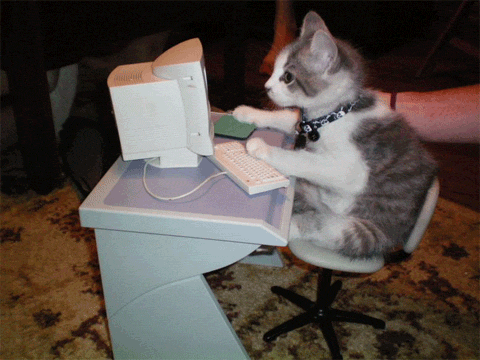
| ● If you liked this post, please give it an upvote. ● Please reblog or re-Hive this post if you found it useful. ● If there are corrections or clarifications I need to make concerning post content, let me know in a comment so I can update the post and give you credit for the correction. ● As I am neither a cetrified professional accountant nor a licensed broker, posts concerning cryptocurrency, commodities, securities, and money are presented for informational purposes only; DYOR. |
|---|
| Public Service Announcements |
|---|
| ● Although I've learned a lot about Hive and its ecosystem of dApps, there's much more I don't know. Where can Hivers new and old learn more? Visit TheTerminal for FAQs, tips, references, and terrific how-to content. ● If your voting power is beneath dusting threshold, follow and use @dustsweeper and @dustbunny to boost your voting power. Authors you upvote will be glad you did, and you'll be happy to start claiming curation rewards. |
| About @magnacarta |
|---|
| My main focus is cryptocurrencies from a number of angles (educational, commentary, observations, even pop culture). A secondary focus is sharing my discoveries about the world of Hive Social. Most of my posts can be found at these two locations: For posts I make at other tribes or communities, start here to locate them : Follow me at this D.Buzz-only account : I also expect Festivus to take off in popularity in the coming years. |
Posted Using LeoFinance Beta
How To Talk Like Doge
Source: https://leofinance.io/@magnacarta/speak-doge-like-kabosu-how-to-speak-doge
Posted by: armourhispithe.blogspot.com

0 Response to "How To Talk Like Doge"
Post a Comment